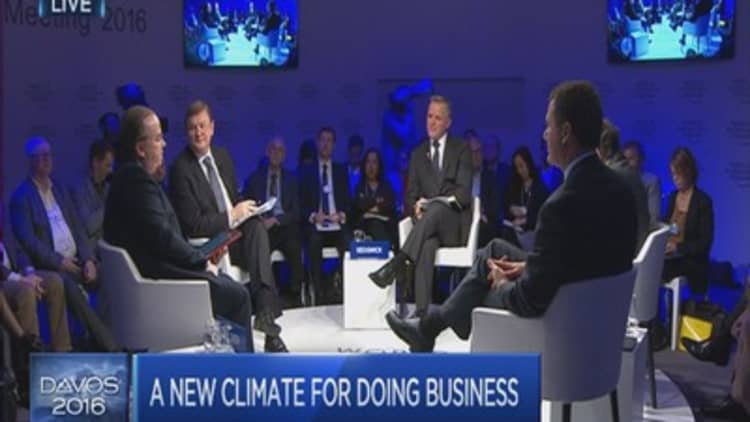


It's barely a month since global leaders reached a landmark deal to bring climate change under control but now the hard work has begun over how to actually reduce countries' and companies' carbon footprints, business and energy leaders told CNBC.
In December, leaders met in Paris for the United Nations' COP21 climate change conference where they agreed to legally binding deal on limiting greenhouse gas emissions. The deal, signed up to by 195 countries, aims to limit global temperature increases to "well below" 2 degrees Celsius above pre-industrial levels and for more developed countries to assist poorer ones in achieving that.
A month after the deal was signed, Christiana Figueres, executive secretary of the UN Framework Convention on Climate Change told a CNBC panel at the World Economic Forum (WEF) that now's not the time for celebration.
COP21 did surpass my expectations but before we sit here and congratulate ourselves I think the success is not yet on the table," she told CNBC's WEF panel and audience on Wednesday.
"Because whether Paris is successful is going to depend on how we interpret and how we act upon the very strong signals that came out of Paris, we need to keep that in mind. (The deal) was the easy part and now comes the difficult part."
The demonization of fossil fuels?
The COP21 deal is ambitious, aiming to effectively eliminate carbon emissions in future. One global industry affected at first-hand from such a target is the fossil fuel sector.
Figueres said it was important that oil and gas companies were not demonized. "(We should not be) demonizing anybody, whether it's a country or the fossil fuel industry, it doesn't help."
"I have been very consistent that the oil and gas industry has to play its part, there is no other way. They sit on access to capital, technology and a mass of engineers who can all be moved over to the new economies while they transition out."
Stuart Gulliver, chief executive of HSBC, told the CNBC panel that it was "not a question of leaving the fossil fuel industry behind."
"Oil and gas companies are major tax contributors to many countries. We cannot isolate these companies…so there has to be an orderly transition" or government budget could be impacted, Gulliver warned.
"What I think is dangerous is this thought there is suddenly some binary moment where everybody effectively abandons the oil and gas and mining companies, it's certainly not workable for a lot of the emerging economies," he said.
Corporate commitments
Companies are proving that they can lead the way when it comes to going green. One multinational company moving towards a more environmental business practice is Walmart.
The company has three big goals, including being supplied with renewable energy, to eliminate waste and to sell more products that are sustainably packaged. In 2010, the company set the goal of eliminating 20 million metric tons of greenhouse gases from its system. It recently announced that it had achieved an elimination of 28 million metric tons.
President and Chief Executive Officer of Walmart Stores, Doug McMillon, told CNBC that the company was planning to improve on those targets going forward.
"What we're trying to do is to use the size and skill of the company to make a difference in the world and to lead by example and to set an example, and at the same time influence those that we do business within our supply chain, large and small…across the gamut of products that we sell."
Feike Sijbesma, chief executive of Dutch nutrition and materials firm DSM agreed that the growth of a company could accompany green policies.
"Growth of the economy and growth of profits in companies can go together for a change, it's not like we have to go back to ancient times and all be very cold, that is not necessary. Today, the technology is available to make the transition from the fossil age to the bio-renewable age we're entering right now."









